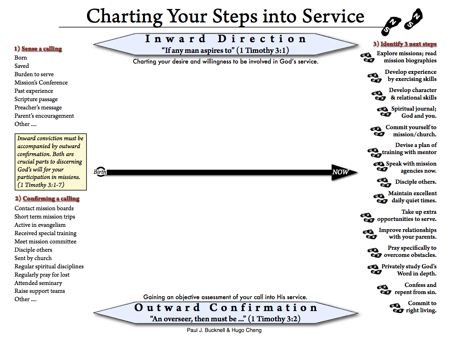
Train Leaders for Ministry
The process of caring for those who have committed themselves
to full-time service.
Rev. Paul J. Bucknell
Train up! | Support God's Work | Leader's Responsibility
Confirmation of the Call | Training Process | General Plan | Specific Plan
Too Many People | Summary
Purchase e-Book (pdf, epub, mobi)
Inward and Outward Confirmation of the Call
Purpose
Inward and Outward Confirmation of the Call is part four of a series on Train Up New Leaders for Ministry which shows how from discerning the inward and outward aspects of a calling from God a leader is able to help the called person how to understand and follow up on his calling.
You may still be thinking about that one person who seems rather unfit for full-time service. He eagerly talks to you about his commitment. You feel awkward, yet he is excited. You want to hold him back while he wants to go forward. How do you handle such a person?
There are two kinds of people we meet up who have a burden to serve God, those that seem capable and those that do not seem right for ministry. Fortunately, we use the same method to approach these individuals.
If you do not sincerely believe that God is calling a person, the worst thing in the world would be to send such a person to seminary or the field.
We need to detect the specific reasons we have difficulty supporting him. Is it because of personal or relationship problems or simply a lack of giftedness. Are they faithful? It is critical that we work through these issues. We do not want to cause more problems by sending someone inappropriate into the ministry!
First spend some personal time with the individual listening to what God is doing in their life. Afterwards, simply tell him that you are excited about what God is doing in his life. Explain that there are two parts to a call, both an inward and outward call.
The inward confirmation describes how God speaks to a person in such a way that they feel burdened about some ministry. The individual feels called to serve because God spoke to his own heart through one of many means. This is difficult to contest. We listen and remember.

The outward confirmation describes the circumstances surrounding the individual that affirms his calling. This should include an assessment from his own church leadership that affirms God is really calling him to full-time service.
A person’s character, circumstances and overall abilities need to be examined. Inward and outward confirmations should complement each other.
A special diagram, Charting Your Steps into Service, has been designed (see above) to help the mentor identify the special equipping God has done in an individual’s life as well as what still needs to be worked on. (Purchase the e-Book (pdf, epub, mobi)
1 Timothy 3:1-7 Confirmation for Ministry
Notice how Paul in 1 Timothy 3:1-7 refers to both kinds of confirmation. The inward confirmation is spoken of in 1 Timothy 3:1 (this is seen from the top left list) while the outward confirmation (the bottom left list in diagram) in verses 3:2-7.
Inward Confirmation |
Outward Confirmation |
“It is a trustworthy statement; if any man aspires to the office of overseer, it is a fine work he desires to do” (1 Timothy 3:1) |
“An overseer, then must be above reproach, the husband of one wife, temperate, prudent, respectable, hospitable, able to teach, ...”(1 Timothy 3:2-7). |
The inward confirmation reveals the way a person ‘aspires’ to serve the Lord. He aspires to serve in this or that way.
This deep desire or burden reflects the way God has privately spoken to the individual. It is also the time that God through some verse or word reveals something about His person that builds up their faith to follow through.
The outward confirmation focuses on a person’s observable character qualities, gifting and includes situations such as his family and the way God has used him in the past.
A Leader’s Project
-
It is always best to openly share these two aspects of both inward and outward confirmation with these ‘called’ individuals. Sometimes people are confirmed on the outward but not the inward. At other times, they are sure God called them (the inward) but lack the confirming circumstances. Share with them your excitement and briefly introduce your plan of action. Don’t let their qualifications, relationships, gifts, good or bad, disguise the necessity of securing both of these confirmations.
-
Explain how you and other leaders will work with them in the next years to confirm their gifts, strengthen their faith, purify their lives, and encourage them in their walk with God. You may be able to share an experience from your own life on how God helped you grow in some certain area of your life to prepare you for ministry. In any case, you do not need to affirm they will be a minister for God but only a willingness to work with them to train them and better discern what God is doing in their lives.
Next => The Training Process










